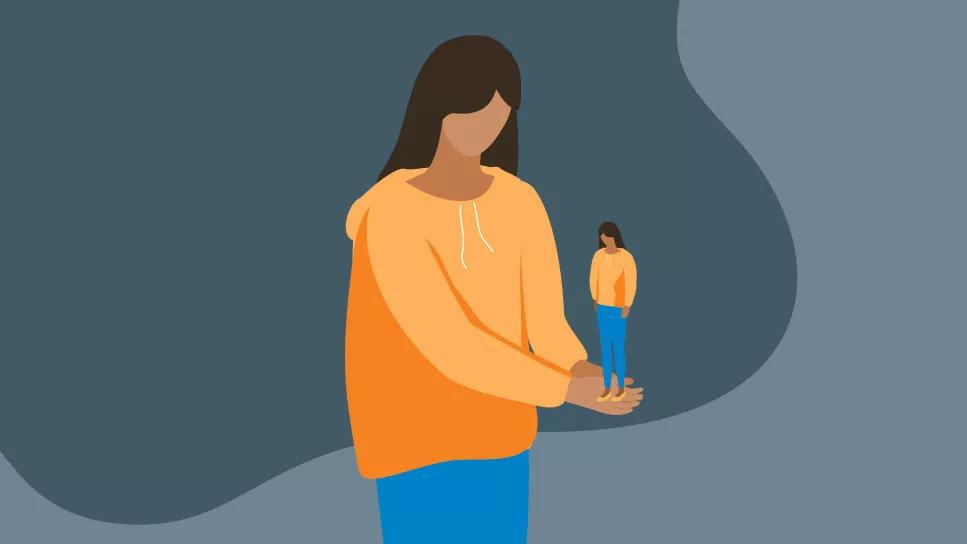Ignore the negative self-talk, practice positive affirmations and remember, you’re not perfect — and that’s OK!

You make a mistake at work, a friend criticizes you or you embarrass yourself during a PTA meeting.
Advertisement
Cleveland Clinic is a non-profit academic medical center. Advertising on our site helps support our mission. We do not endorse non-Cleveland Clinic products or services. Policy
We’ve all been there. There are plenty of situations in life when our self-esteem takes a hit and we struggle with how to be more confident.
But what exactly is self-esteem?
Whether it’s going up, down or hovering somewhere in the middle, our self-esteem impacts how we view ourselves. Self-esteem is an important building block for many things: Our confidence in our abilities, our sense of self-worth and how we compare ourselves to others.
Low self-esteem — when you’re critical of yourself — can develop over time, but you can bring it back up by changing the way you perceive yourself and your negative thoughts.
And having good self-esteem isn’t just feeling good about yourself. Your sense of self-worth can profoundly affect your mental health, too.
“I think it’s incredibly important for your mental health to have confidence in your abilities so you have a good sense of self-worth,” reinforces psychologist Lauren Alexander, PhD. “And that you have the ability to grow and recognize that mistakes are normal.”
Low self-esteem can lead to bigger issues like depression and anxiety. In fact, they often go hand in hand.
“Anytime you are struggling with a mental health issue, it’s good to think about your self-worth and how you see yourself,” Dr. Alexander says.
Advertisement
Dr. Alexander explains how to build confidence and how to improve self-esteem.
Low self-esteem can come across in many ways — but in simple terms, it’s being excessively mean to yourself. It can be hard to accept that you might be experiencing low self-esteem. But recognizing it is the first important step to working against those negative thoughts.
You may have low self-esteem if you:
Are you always second-guessing yourself? Maybe you’re not sure about a project at work or you’re dealing with a challenging parenting situation. Either way, you may think you don’t have the right skills or experience to handle it.
“If you become preoccupied with excessive doubt of yourself and your abilities, it’s going to become apparent in your work and personal life,” says Dr. Alexander. “Even if it’s not apparent to everyone else, the quality of your relationships and your work life will decline and you’ll definitely notice it.”
Sure, who hasn’t compared themselves to others — it’s hard not to. But it might be a problem if you’re doing so in a negative way by judging yourself against others and beating yourself up for not being pretty enough, being a model parent, having a bigger house, taking social media-worthy vacations (the list of how you think you might not stack up may be long).
“You’re living one life and that’s yours. If you’re spending your precious mental energy focused on other people’s lives, then you’re only half-heartedly living yours,” stresses Dr. Alexander. “This means you won’t be making the best decisions to advance your life.”
Failure happens to all of us. But when you make a mistake — even a teeny, tiny one — it can be hard for you not to spiral into negative self-talk.
“Triggers vary widely amongst people,” says Dr. Alexander. “Common indicators of being triggered include any strong, uncomfortable emotion such as sadness and anger and/or engaging in unhelpful behaviors for example, eating when not hungry, drinking/drug use, avoiding social interactions.”
Whether it’s coming from your partner, your boss, your parent or a friend, it can be difficult for you to hear any kind of feedback (even constructive criticism) on how you do X, Y or Z.
“In general, we want to hear about what’s good about us rather than what’s not good about us or we need to do better,” relates Dr. Alexander. “What’s not good or needs improved indicates that we need to change and change can be threatening for a variety of reasons such as inflexibility or doubt in our ability to change.”
Advertisement
So, not only do you feel triggered when you make a mistake, but it can also be hard for you to let those situations go. You dwell on your failures — replaying situations in your head, over and over, to figure out how you could have avoided the failure. Practicing self-compassion and self-love is hard for you.
“Often, we’re thrown off by mistakes rather than learn from them. Then, we struggle to regulate the emotions associated with the failure and hyperfocus on them,” notes Dr. Alexander.
You’re so down on yourself and your abilities that it can zap you of any enthusiasm or interest you may feel about upcoming activities, celebrations or work projects. You become anxious that you’re going to mess up, make a mistake and cause it all to go wrong.
“Anxiety can definitely reinforce low self-esteem. For instance, anxiety interferes with task initiation, meaning that you may not end up completing something you need to do,” explains Dr. Alexander. “Then, you use this instance as ‘proof’ of why you’re a failure. Then, those negative emotions make it less likely for you to do another task that could be helpful and the cycle repeats itself.”
If you’ve recognized low self-esteem in yourself, you may want to think about some of the possible root causes. Dr. Alexander says negative self-talk and thoughts often stem from things in our past.
Advertisement
“It’s rarely just one, single event,” she says. “It’s usually an accumulation of events that contribute to low self-esteem.”
For example, maybe a memory of a classmate who didn’t accept you into their group still lingers when you try to make new friends or connections. Or maybe you struggled after getting a bad grade on a test, and now, you still get the fear that any time you’re tested, you won’t succeed.
All of these experiences — and how we react to them — can accumulate and cause low self-esteem over time.
Here’s how to build self-esteem.
So, how do you raise your self-esteem? Start by editing that negative narrative in your head.
Easier said than done, we know. But Dr. Alexander says there’s no better way to improve your self-esteem than to stop piling on those negative thoughts.
How do you change the way you think? The first step is recognizing these negative thoughts and acknowledging if they’re actually serving you or hurting you.
“A lot of times, people have very extreme styles of thinking, and they distort information and come up with very different assessments of the situation,” explains Dr. Alexander.
Think of it as detective work: You’re finding evidence that disproves all the negative facts you’re telling about yourself. Dr. Alexander says that this way, you’re sort of rewiring your brain to change how you view yourself.
Advertisement
For example, if you have the thought: I messed up this project at work, now I’ll never be able to do anything right, catch yourself and ask some rational questions like:
“Changing your thinking is a big component. It’s important to change what is being repeated in your mind,” Dr. Alexander stresses. “You need to systematically start changing your thinking.”
If those negative thoughts are still creeping through, it means you need to start putting positive ones into action. Just thinking better about yourself isn’t enough.
“You have to act the part of those new thoughts,” states Dr. Alexander.
One good way to do this is to engage with others. Many low self-esteem issues come from the fear of others not accepting you. But isolating yourself isn’t going to help.
“If you’re not giving yourself a chance to go out and interact with people, you won’t be able to see that maybe they, in fact, might really enjoy your company,” says Dr. Alexander. “The more you practice, the more it will become a part of you.”
No one — and we mean, no one — has ever gone through life without making even one mistake. Dr. Alexander explains that gracefully accepting errors will help your self-esteem grow.
“I think the one part of self-esteem that people struggle with the most is learning to accept errors,” she shares. “And also learning how to move past those errors.”
This can stem from a need to have everything go perfectly. In reality, mistakes are bound to happen.
Of course, we all want to succeed and pass with flying colors. But Dr. Alexander notes that you should never feel so afraid of failure that it stops you from trying. This can lead to paranoia, anxiety and shutting yourself away from others.
Sometimes, in order to change the story in your head, you need to say it out loud. Saying positive affirmations to yourself has been shown to help people with boosting their confidence and building better habits.
Try and write out specific affirmations that work best for you and your situation. These can be a powerful way to rewire the way you think about yourself.
Learning how to increase your self-esteem is important, but you also want to have balance. You want to be confident in yourself, while still accepting room for growth. You can’t let the scale fall too far to the other side, Dr. Alexander says.
“A healthy self-esteem means you have a sense of your worth, you have confidence in your abilities, but that there’s also room for growth and for detecting errors,” she adds.
Whether you’re struggling with self-esteem related to work, body image or your general self-worth, it’s important to work toward a more positive outlook of yourself. Low self-esteem can build over time — usually due to negative thoughts. But thankfully, there are ways to challenge them through positive affirmations and mental exercises.

Sign up for our Health Essentials emails for expert guidance on nutrition, fitness, sleep, skin care and more.
Learn more about our editorial process.
Advertisement

Focusing on non-physical attributes, practicing body positivity or neutrality, and avoiding comparisons can help

This pattern of self-doubt leads you to worry that someone will discover you’re a fraud and that you don’t deserve the success you’ve earned

Obsessively assessing your appearance? Cognitive behavioral therapy and journaling can help you figure out why you’re doing it — and how to stop

It’s a continual process, but through meaningful practices, you can find peace and positivity with yourself

Horoscopes, fortunetellers and personality tests all feed into our cognitive biases and reinforce our own feelings as true

Foster communication about social media, encourage whole-person attributes and be mindful of your own negative self-talk

Filters and editing can lead to low self-esteem, depression and even body dysmorphic disorder

Wearing this undergarment for too long will do more harm than good

Even small moments of time outdoors can help reduce stress, boost mood and restore a sense of calm

A correct prescription helps your eyes see clearly — but as natural changes occur, you may need stronger or different eyeglasses

Both are medical emergencies, but they are very distinct events with different causes